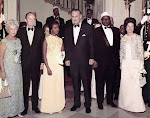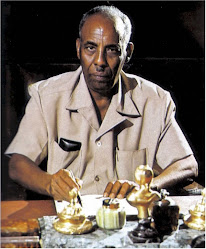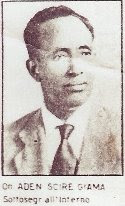
ON ALERT: Ugandan Africa Union peacekeepers patrol the international sea port in Mogadishu.
Somali Islamist fundamentalists, the al Shabaab, last week shelled the Presidential Palace, Villa Somalia, which is guarded by Ugandan peacekeepers under the hospice of African Union Mission in Somalia (Amisom). The fighting that lasted three days left 20 people dead. It preceded the death of a Ugandan soldier who was killed by a road suicide bomb. Risdel Kasaira talked to Amison spokesman Maj. Ba-Hoku Barigye in Mogadishu on a wide range of Somalia-related issues.
There has been a lull in the Mogadishu fighting for the last couple of months. Why are the attacks intensifying now, and what is the threat assessment to Amisom, and what could be done to contain a full scale onslaught on their positions?
There has not been a lull in the Mogadishu skirmishes like you portray it. What you are possibly referring to is periodic calmness when the senseless attacks by the violent armed opposition groups on the general population, government and Amisom are suspended.
Such suspensions often occur when there is infighting amongst these groups or when they have run short of ammunition or both of these. Otherwise, disruptions of the peace process and disturbances of the population by these negative forces have been quite frequent. This, however, doesn’t mean that Mogadishu is melting. The positions and stature of the Transitional Federal Government (TFG) and Amisom have remained intact for over a year. The violent armed groups have no capacity whatsoever to dislodge TFG and Amisom forces from their positions.
The solution to this conflict which affects not only Somalia but also the region, the continent and the whole world is political, not military. It is political because the conflict itself is political and quite complex. The solution therefore is to stabilise the country by establishing durable and sustainable peace and security through dialogue and reconciliation by all the people of Somalia, including the violent armed groups once they denounce violence. The gun has been used for the last 20years and has not proven to work.
There has not been a lull in the Mogadishu skirmishes like you portray it. What you are possibly referring to is periodic calmness when the senseless attacks by the violent armed opposition groups on the general population, government and Amisom are suspended.
Such suspensions often occur when there is infighting amongst these groups or when they have run short of ammunition or both of these. Otherwise, disruptions of the peace process and disturbances of the population by these negative forces have been quite frequent. This, however, doesn’t mean that Mogadishu is melting. The positions and stature of the Transitional Federal Government (TFG) and Amisom have remained intact for over a year. The violent armed groups have no capacity whatsoever to dislodge TFG and Amisom forces from their positions.
The solution to this conflict which affects not only Somalia but also the region, the continent and the whole world is political, not military. It is political because the conflict itself is political and quite complex. The solution therefore is to stabilise the country by establishing durable and sustainable peace and security through dialogue and reconciliation by all the people of Somalia, including the violent armed groups once they denounce violence. The gun has been used for the last 20years and has not proven to work.
Do you think Somalia will be sustainably stabilised without you (Amisom)? Elaborate on the new Amisom mandate (given by AU to actually engage in offensive operations) – what does it entail?
Amisom is not in Somalia for war, it is not there to fight anyone or to occupy any territory. We are in Somalia to create an enabling environment that can facilitate dialogue and reconciliation amongst the Somalis. We therefore have no enemies but rather misguided local and foreign elements, supported and financed by international terrorist networks, who take advantage of a young government to cause chaos and anarchy that adversely affects the innocent majority peace-loving Somalis.
The population is a hostage of these elements. It is this innocent civilian population that we seek to protect and enable access to humanitarian assistance and these two are the cornerstones of our work in Somalia. The mandate of Amisom has not been changed at all and Amisom is not engaged in any offensive operations, you are possible talking about the Rules of Engagement (RoE) that were revised to suit the operational environment.
Amisom is not in Somalia for war, it is not there to fight anyone or to occupy any territory. We are in Somalia to create an enabling environment that can facilitate dialogue and reconciliation amongst the Somalis. We therefore have no enemies but rather misguided local and foreign elements, supported and financed by international terrorist networks, who take advantage of a young government to cause chaos and anarchy that adversely affects the innocent majority peace-loving Somalis.
The population is a hostage of these elements. It is this innocent civilian population that we seek to protect and enable access to humanitarian assistance and these two are the cornerstones of our work in Somalia. The mandate of Amisom has not been changed at all and Amisom is not engaged in any offensive operations, you are possible talking about the Rules of Engagement (RoE) that were revised to suit the operational environment.
What is needed to have a peaceful Somalia and who is supplying al Shabaab, and can’t this source of weapons and ammunition be cut off?
There is no doubt that peace will return to Somalia. This can happen if all the Somalis put aside their differences and work towards security, peace and stability through genuine and all inclusive dialogue and reconciliation. Somalia is a sovereign country but is currently unable to implement programmes that can lead it to achieve this desired state of affairs. It is threatened by the local extremists supported by international terrorist networks that find a fertile ground because of the vacuum created by the lack of a strong state. It lacks institutions and capacity to implement any meaningful programmes that can alleviate the suffering of the people who have been traumatised for the last 20 years.
The current government can only achieve meaningful progress with the assistance and support of the rest of the international community. Such assistance and support should be directed towards such sectors as capacity and institutional building, logistical, financial and humanitarian relief. Amisom, with the support of the international community is already helping in some of these endeavours.
Cutting off the support to the violent armed groups is vital and efforts by the UN in this direction are very welcome. A number of resolutions targeting all such spoilers have been passed and it is hoped that in the near future, such targeted sanctions will bear fruits.
There is no doubt that peace will return to Somalia. This can happen if all the Somalis put aside their differences and work towards security, peace and stability through genuine and all inclusive dialogue and reconciliation. Somalia is a sovereign country but is currently unable to implement programmes that can lead it to achieve this desired state of affairs. It is threatened by the local extremists supported by international terrorist networks that find a fertile ground because of the vacuum created by the lack of a strong state. It lacks institutions and capacity to implement any meaningful programmes that can alleviate the suffering of the people who have been traumatised for the last 20 years.
The current government can only achieve meaningful progress with the assistance and support of the rest of the international community. Such assistance and support should be directed towards such sectors as capacity and institutional building, logistical, financial and humanitarian relief. Amisom, with the support of the international community is already helping in some of these endeavours.
Cutting off the support to the violent armed groups is vital and efforts by the UN in this direction are very welcome. A number of resolutions targeting all such spoilers have been passed and it is hoped that in the near future, such targeted sanctions will bear fruits.
There have been reports of some Al Qaeda agents running away from Afghanistan to seek safe haven in Somalia. Doesn’t this complicate the Somalia situation?
The Somali situation with or without Al Qaeda or any other foreigners is already complicated. What the hardliner foreigners will add to it are skills and experience. But if the international community can act fast and in time either by supporting Amisom or by the UN taking over the mission to give it the required logistical support, then this could be averted. But if this is not done, the magnitude of the problem may become greater with dire consequences to the whole world.
The Somali situation with or without Al Qaeda or any other foreigners is already complicated. What the hardliner foreigners will add to it are skills and experience. But if the international community can act fast and in time either by supporting Amisom or by the UN taking over the mission to give it the required logistical support, then this could be averted. But if this is not done, the magnitude of the problem may become greater with dire consequences to the whole world.
Does AU need reinforcement to flash-out these insurgents? Do you see Uganda being drawn into a full-scale war with the insurgents as a consequence of their baiting of Amisom?
What is important is not reinforcements but rather a formula that can bring together the Somalis to find solutions that can resolve this conflict. But reinforcements are important to achieve the troop levels (8,000) planned for the mission in 2006; the required capacity for them to deliver on the mission and in consideration of the current dynamics, challenges and threats. UPDF is part of the larger family of the AU member states that responded to the call when Amisom was formed. So many countries pledged troops and so the issue of Uganda does not arise. We encourage all those countries that pledged and others from the African continent and elsewhere to deploy because all other options might be more disastrous.
What is important is not reinforcements but rather a formula that can bring together the Somalis to find solutions that can resolve this conflict. But reinforcements are important to achieve the troop levels (8,000) planned for the mission in 2006; the required capacity for them to deliver on the mission and in consideration of the current dynamics, challenges and threats. UPDF is part of the larger family of the AU member states that responded to the call when Amisom was formed. So many countries pledged troops and so the issue of Uganda does not arise. We encourage all those countries that pledged and others from the African continent and elsewhere to deploy because all other options might be more disastrous.
You recently said that you had information on seven suicide bombers with vehicles loaded with explosives ready to strike in Mogadishu. Do you have actionable intelligence on these people?
Our operational plans and actions and indeed many military plans are not a subject of public discussions and debates. The fact is that the vehicles do exist and we will continue to monitor all the movements of the forces opposed to the peace process not only on their suicide bomb plans but on all other actions intended to disrupt and hurt the innocent civilians.
Our alertness and vigilance is permanent and our capacity has been improving and that is how a recent suicide attack on our newest base in Shangani District in South Eastern Mogadishu was foiled. We will continue to work with the people of Mogadishu specifically and Somalia in general through their government to achieve everlasting peace for this country.
Our operational plans and actions and indeed many military plans are not a subject of public discussions and debates. The fact is that the vehicles do exist and we will continue to monitor all the movements of the forces opposed to the peace process not only on their suicide bomb plans but on all other actions intended to disrupt and hurt the innocent civilians.
Our alertness and vigilance is permanent and our capacity has been improving and that is how a recent suicide attack on our newest base in Shangani District in South Eastern Mogadishu was foiled. We will continue to work with the people of Mogadishu specifically and Somalia in general through their government to achieve everlasting peace for this country.
The relatives of some dead Ugandan soldiers have not been compensated. Why?
The question of compensation of our fallen comrades is a question between the Troop Contributing Country (TCC) and the AU. There are procedures and processes in place to address this and no one from Uganda or elsewhere, including the families that have lost their dear ones, should get worried about compensating the fallen comrades.
I am sure the UPDF can show you statistics of the fallen soldiers and how many of these have been compensated. Those who are not yet compensated will obviously be compensated.
The question of compensation of our fallen comrades is a question between the Troop Contributing Country (TCC) and the AU. There are procedures and processes in place to address this and no one from Uganda or elsewhere, including the families that have lost their dear ones, should get worried about compensating the fallen comrades.
I am sure the UPDF can show you statistics of the fallen soldiers and how many of these have been compensated. Those who are not yet compensated will obviously be compensated.



.jpg)











No comments:
Post a Comment